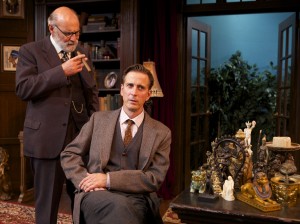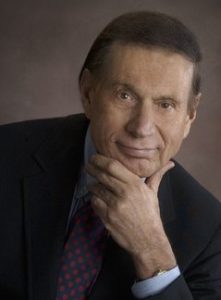Arguably, ‘Freud’s Last Session’ Is a Hit
It’s ironic (and cool) that Freud’s Last Session, currently at North Coast Repertory Theatre, is set in the northwest London of September 1939. For some, man then stood at eternity’s door as World War II would inexorably unfold, fueling debates about the afterlife and indeed whether there was such a thing at all. Atheist Sigmund Freud and converted Christian C.S. (Clive Staples) Lewis, two of the 20th century’s titanic men of letters (they never met in real life), are rapt in each other’s worldviews while air raid sirens herald the specter of the blasts that could end their discussions once and for all.
Playwright Mark St. Germain takes Lewis’ side, but he leaves it up to us to discover that amid his subtle anecdotal touches. For that reason, this is a very good show; for several others, it’s excellent. Meanwhile, don’t go expecting either man to hit you over the head with a theist’s bouquet or a nonbeliever’s brickbat. There aren’t any epiphanies here, and that’s just as well amid the passionate, unusually civil debate.

Religious figurines ironically clutter a desk as Sigmund Freud (Michael Santo, left) mixes things up with C.S. Lewis (Bruce Turk). Photo by Aaron Rumley
Both men are in a fairly good humor upon their meeting, although each is unshaken in his disposition on God, life and love. Oxford don Lewis, in his early 40s here and on the brink of literary success, had once espoused atheism as he allegedly slathered himself with beer and booze years after his mom’s death, for which he almost never forgave himself; at 83, preeminent psychiatrist and legendary cigar-chomper Freud had a debilitating jaw cancer and had lost a daughter to illness. These diametric lives are no match for the men’s intellects and powers of reason; the quips come eagerly even as the radio in Freud’s study stands at the ready with evil tidings about the Nazis’ invasion of Poland.
A sheepish Lewis says it’s silly to think the question of God’s existence can be settled in an afternoon, especially if the proof involves reason; the irascible Freud responds it’d be even sillier not to think about such things at all.
Slowly but surely, St. Germain lets us in on his side in this debate, and he does it quietly, through his actors and plot points alone. Freud, after all, requested an audience with Lewis in the first place; he’s clearly the more defensive of the two as he seeks justification for his worldview and his wish that religion would just go away; he’s the one who harbors scads of religious relics on his desk; and above all, he’s silently baffled by his unequaled success in the face of God’s absence. As the show ends, he’s left to suck it all in in silence and aloneness, an iconic steward of modern psychiatry steeped in what vaguely resembles our pity.

Armand Nicholi’s ‘The Question of God’ notes that Freud and Lewis agreed on several matters of importance.
Bruce Turk’s Lewis is a thoroughly stageworthy foil and father confessor, whose mental toughness bests Freud’s when it has to, with none of the excess to which protagonists often fall prey. Michael Santo’s Freud is as unimaginably stoic in his illness (his jaw prosthesis wraps him in pain if he talks too much) as in his atheism. In one scene, Lewis comes to his aid amid overwhelming discomfort; Santo is masterful as he reveals the first hint of a crack in Freud’s veneer.
Set designer Marty Burnett didn’t spare much in reproducing Freud’s actual study — vintage pictures reflect the den’s dark, frenetic character (especially when it comes to the figurine-laden desk), and like in the images, Burnett’s according treatment scales almost the entire rear wall. Alina Bokovikova’s costumes fuel the men’s disparateness, Freud in his undertaker black and Lewis in unobtrusive, almost prim attire. Matt Novotny’s lights are appropriately one-note — the focus is on the debate, and Novotny keeps it that way until the gentle fade that marks the end.
In his book The Question of God, Harvard Prof. Armand Nicholi Jr. unwittingly gives rise to the idea behind the play, noting that Freud and Lewis agreed on things like great writing and the coolness of dogs. He further says that the two placed fundamental importance on the notion of God’s existence — maybe that’s what helped define each man’s abiding respect for the other. Director David Ellenstein and his cast and crew sense that admiration and have mounted their play accordingly. As Lewis notes, the men’s conversation won’t yield any answers — and quite correctly, Ellenstein and St. Germain say it doesn’t need to.
This review is based on the matinee performance of Oct. 19. Freud’s Last Session runs through Nov. 9 at North Coast Repertory Theatre, 987-D Lomas Santa Fe Drive in Solana Beach. From $41. (858) 481-1055, northcoastrep.org.

Martin Jones Westlin, principal at editorial consultancy Words Are Not Enough and La Jolla Village News editor emeritus, has been a theater critic and editor/writer for 25 of his 47 years…
More…


